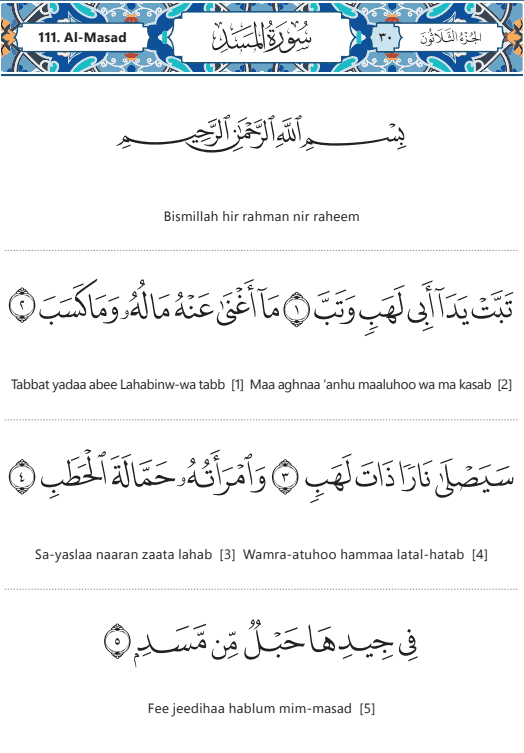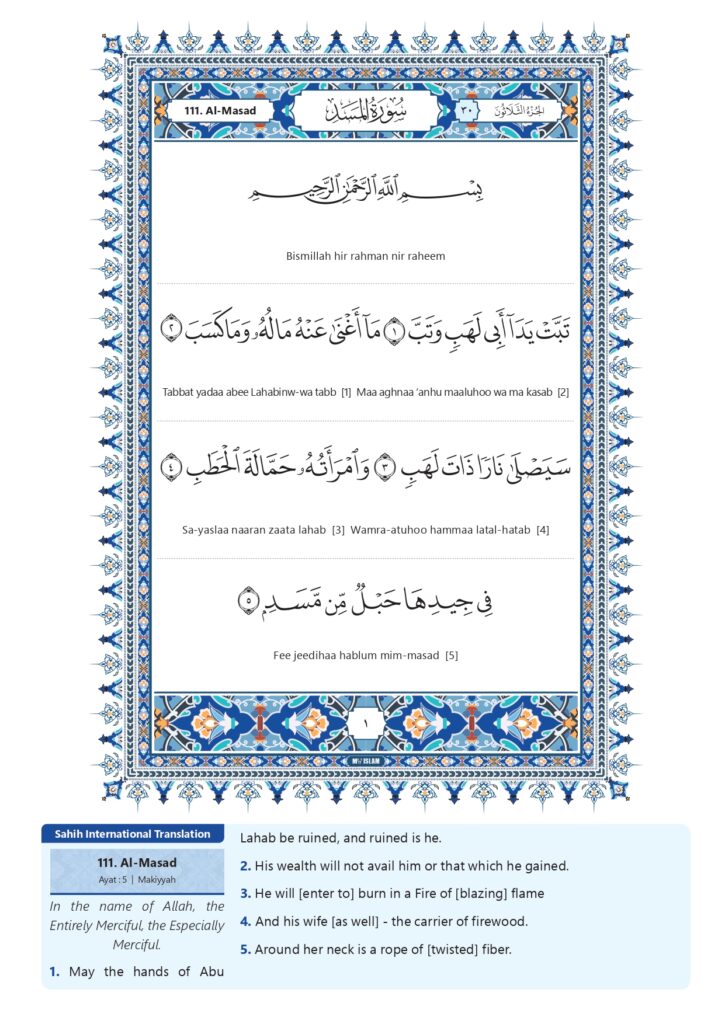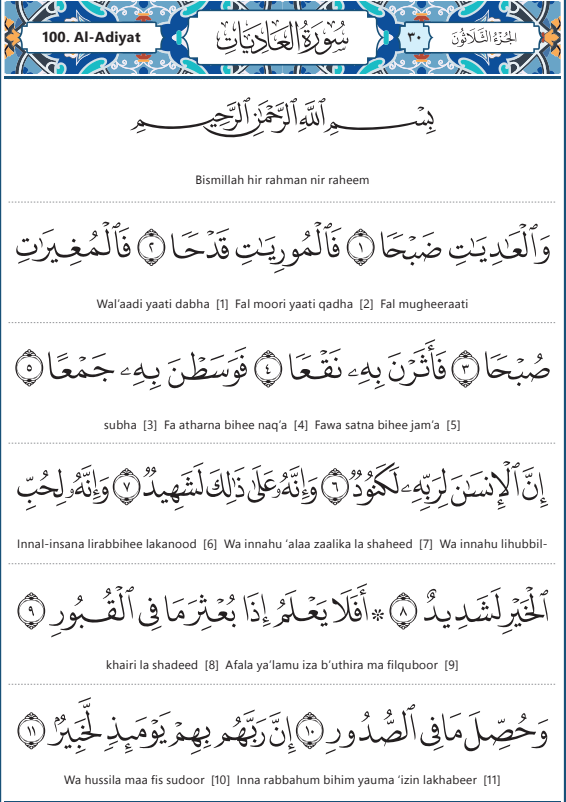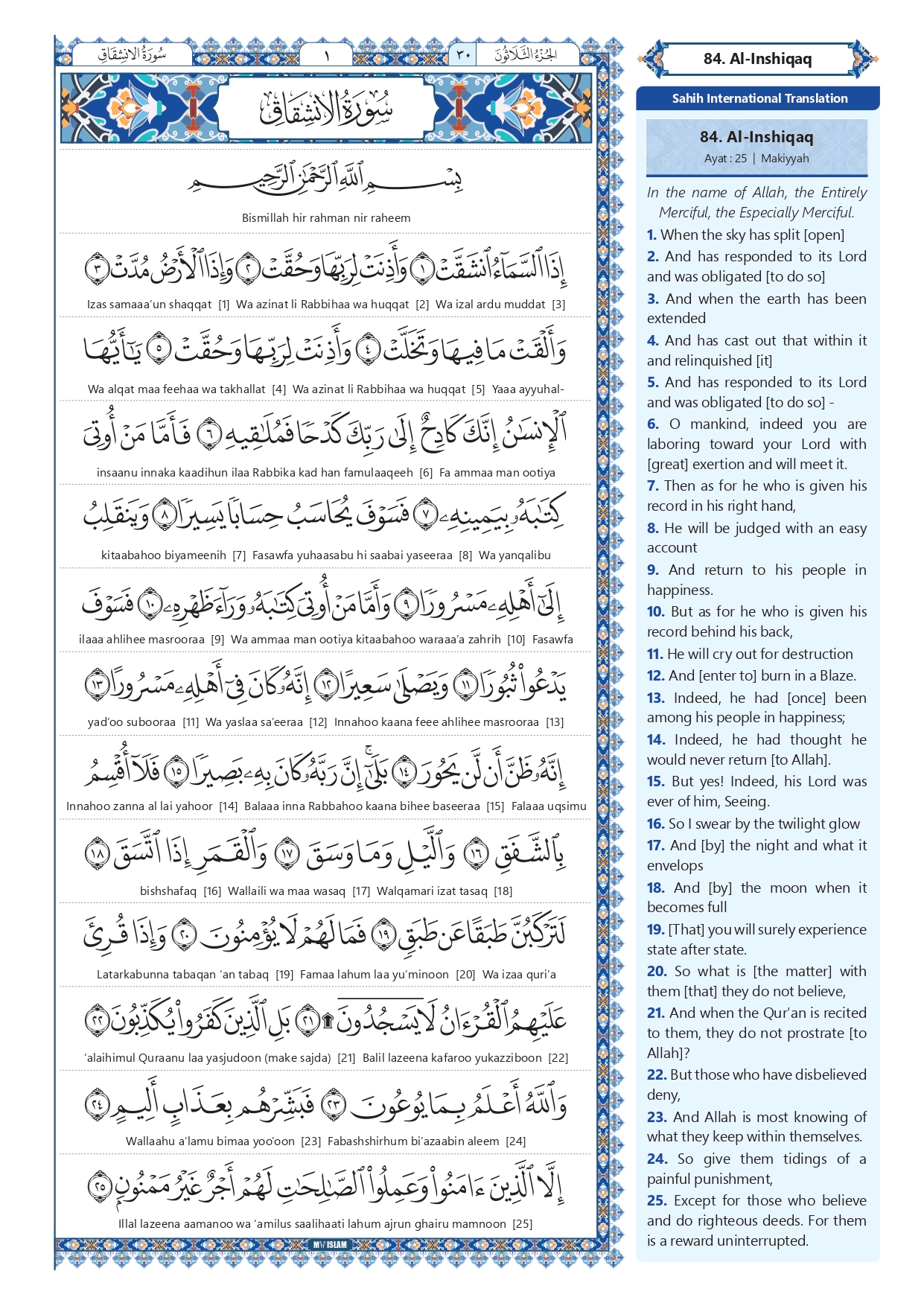Surah Al-Masad (سورة المسد) is the 111th chapter of the Quran, consisting of five verses. The surah condemns the actions of Abu Lahab, one of the staunchest enemies of the Prophet Muhammad (peace be upon him), and his wife. It emphasizes that their rejection of the message of Islam will result in punishment in the Hereafter. The word “Al-Masad” refers to twisted strands of palm fiber, symbolizing the punishment awaiting Abu Lahab’s wife.
This surah carries significant lessons about the consequences of rejecting divine guidance and mistreating the Prophet Muhammad (peace be upon him).
Surah Al-Masad Transliteration

Transliteration of Surah Al-Masad text:
A’uthu billahi min ash-shaytan ir-rajim
Bismillahir Rahmanir Rahim
- Tabbat yadaa abee lahabinw-wa tabb
- Maa aghnaa ‘anhu maaluhoo wa ma kasab
- Sayaslaa naran Thaata lahab
- Wamra-atuh hamma-latal hatab
- Fee jeedihaa hablum mim-masad
English Translation of Surah Al-Masad:

In the name of Allah, the Most Compassionate, the Most Merciful
- Perish the hands of Abu Lahab, and perish he!
- Neither his wealth nor his gains will avail him.
- He will burn in a Fire of blazing flames,
- And his wife, the carrier of firewood,
- Will have a rope of palm fiber around her neck.

al fatiha surah Transliteration Read Surah fatiha online 1
Surah Al-Masad:
Surah Al-Masad teaches that arrogance leads to loss.
Let its lesson keep your heart humble.

Come back anytime to Arabic-OM.com and stay guided.
The Significance and Lessons of Surah Al-Masad
Surah Al-Masad teaches important lessons about the consequences of arrogance, stubborn rejection of the truth, and hostility towards the Prophet. It is a reminder that no worldly wealth or power can protect one from divine judgment if they oppose righteousness.
Great job on finishing Surah Al-Masad! Now we’re ready to read the best and most beloved surah in our hearts, Surah At-Tawheed, which is Surah Al-Ikhlas.
surah ikhlas Transliteration in English with Video to Correct Your Recitation
Key Lessons from Surah Al-Masad:
- Consequences of Opposing the Prophet: Abu Lahab and his wife were key figures in the opposition to Islam. Their fate is a warning to those who harm the messengers of Allah.
- The Futility of Wealth: This surah demonstrates that material wealth cannot save a person from divine punishment.
- A Reminder of Accountability: Surah Al-Masad underscores the importance of accountability for one’s actions, especially when they involve enmity towards the truth.
How to Recite Surah Al-Masad Correctly
To ensure you recite Surah Al-Masad with proper pronunciation (Tajweed), watch our video tutorial that guides you through the recitation. The video will help you improve your pronunciation and understand the meaning of each verse.
surah-al-masad-transliteration
Frequently Asked Questions (FAQs) About Surah Al-Masad:
1. What is Surah Al-Masad about?
Surah Al-Masad condemns the actions of Abu Lahab and his wife for their persistent opposition to the Prophet Muhammad (peace be upon him) and the message of Islam. It foretells their punishment in the Hereafter.
2. Why is it called “Al-Masad”?
The word “Al-Masad” refers to twisted strands of palm fiber, symbolizing the punishment awaiting Abu Lahab’s wife, who is described as carrying firewood with a rope of palm fiber around her neck.
3. What lessons can we learn from Surah Al-Masad?
This surah highlights the consequences of rejecting the message of Islam, the futility of wealth and power in protecting against divine punishment, and the importance of respecting the Prophet Muhammad (peace be upon him).
4. Who was Abu Lahab?
Abu Lahab was the uncle of the Prophet Muhammad (peace be upon him) and a fierce opponent of Islam. He, along with his wife, played a significant role in persecuting the early Muslim community.
5. Why is Surah Al-Masad significant?
Surah Al-Masad is significant because it is a direct response to the hostility of Abu Lahab and his wife towards Islam. It serves as a timeless lesson about the consequences of arrogance, enmity, and the rejection of divine truth.
6. Can I recite Surah Al-Masad for protection?
While Surah Al-Masad is not specifically recited for protection, it serves as a reminder of the fate of those who oppose divine guidance. Reciting the surah strengthens one’s faith in the accountability of wrongdoers.
7. When should Surah Al-Masad be recited?
Surah Al-Masad can be recited at any time, particularly in prayers or when reflecting on the consequences of arrogance and opposition to the truth.
8. How does Surah Al-Masad connect to other short surahs?
Surah Al-Masad shares a theme with other short surahs like Surah Al-Falaq and Surah An-Nas, which focus on protection and consequences of rejecting Allah’s guidance. It serves as a reminder of the importance of humility and obedience to Allah.
9. What is the historical context of Surah Al-Masad?
Surah Al-Masad was revealed in Makkah, during a time when Abu Lahab and his wife were actively opposing the Prophet Muhammad (peace be upon him) and spreading hostility towards Islam.
10. How can I improve my recitation of Surah Al-Masad?
To improve your recitation of Surah Al-Masad, practice regularly and listen to recitations by qualified teachers. Watching video tutorials that focus on proper Tajweed (rules of recitation) can also help improve your pronunciation.
Conclusion
Surah Al-Masad serves as a powerful reminder of the consequences of opposing divine guidance and mistreating the messengers of Allah. Through its vivid depiction of the fate of Abu Lahab and his wife, it offers valuable lessons in accountability, the limitations of wealth, and the importance of humility.
To explore more Quranic recitations and their meanings, don’t forget to visit Surah Al-Falaq Transliteration and Surah An-Nas Transliteration


